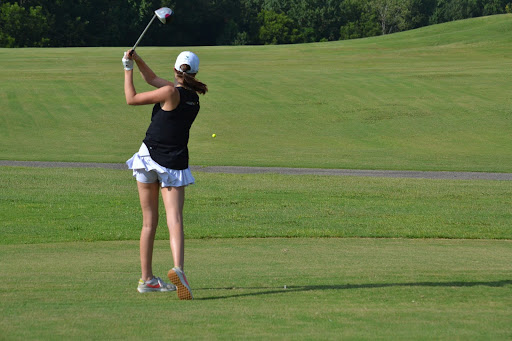Lush green grass, green uniforms, green golf carts, green flags and the greenest of all: money. For many people, golf rings the same golden bells as wealth.
In most shows and movies, golf is played only by the preppiest characters. With more popular sports like football and basketball in constant conversation, golf is only discussed when it is for the rich kids. Right?
“Golf is portrayed as a wealthy sport,” Charlie Russell (10) said. “People think the wealthier you are, the more likely you are to be exposed to it.”
But White Station High School (WSHS)’s own coach, Jeremy Bateman, did not come across the sport due to wealth. Bateman played with friends occasionally with cheap clubs he had. He stumbled across the coaching position around 11 years ago when he accidentally entered an established coaches’ meeting thinking it was a coaching interest meeting. When offered the assistant position, he accepted and became head coach after the previous one retired.
“I bought my first real set of clubs the summer I found out I’d become the assistant golf coach,” Bateman said. “Before that, I used a set of clubs I got for 30 bucks.”
WSHS’s golf team excels against its inner-city companions, but struggles to compete with some of the suburban and private schools — schools that are known for having a wealthier class of students and a lot more golfers.
“We normally win in MSCIAA,” Charlotte Cheng (10) said. “But we aren’t as good as Houston or Bartlett.”
Some might blame the lack of golf players on the sport’s expenses, but compared to other sports at WSHS, the golf team’s fees are lower. Female soccer players each have to pay $250, while JV golfers only have to pay $100 and varsity players pay $225.
“Schools like MUS want to play with us, but they want to use the super nice courses,” Bateman said. “I’m trying to keep this as cheap as possible for [the players].”
If fees are not the culprit, maybe the equipment is. Every player needs clubs, but they do not have to be a $1000 set; second-hand clubs come at a much lower rate. The unnecessary nature of expensive golfing equipment is similar to how every baseball player does not need the most expensive bat, glove, or cleats in order to play. The price of the sport is how much a player is willing and able to invest.
“For high school students, only a few clubs are necessary,” said Bateman. “It’s only expensive if you buy all the fancy clothes and play all the super nice courses.”
Since WSHS’s team is a competitive team — one that requires students to own clubs and have some experience to join — there may not be enough ways students in Memphis are exposed to the sport. Though it is true that most people are introduced to the sport because their family, typically a wealthier one, introduced them to it, young people are able to play at multiple courses in Memphis for free or for just $5. If a student has a genuine interest in the sport, they can develop their skills for much less than what is typically expected.
“The LeMoyne-Owen golf coach is offering free lessons,” Bateman said. “If you’re a Memphis Shelby golf team member, you can sign up.”
Golf is a sport based on respect. When a golfer prepares to hit, everyone is silent. Once they hit, everyone claps. If it is a good hit, everyone congratulates them. At competitions, golfers are paired with another from a different school, easily creating an environment to form friendships and connections. Human respect, sportsmanship and communication skills can thus be developed through golfing.
“[At a competition], you’re paired with someone and it gives you quite a few hours to talk to them,” Cheng said. “It’s pretty fun.”
So if WSHS fees are not too high, equipment does not have to be the most expensive, students are able to play or learn for very little and it teaches beneficial skills, why can the golf team not compete with private or suburban schools? The same reason why WSHS’s other sports are increasingly unable to compete with them: the majority of our students do not come from wealth. Lack of wealth can be overpowered in individually succeeding in a sport. As for teams, every school needs the money to compare to those who have more funds. More money means more free time to practice than what would be taken up by a job; it means having access to better practice facilities; it means having more players who have been playing for far longer.
“Historically, we have been a team of public course players,” Bateman said. “I can’t compete with kids who have parents who have been taking them to the country club ever since they can remember.”




































